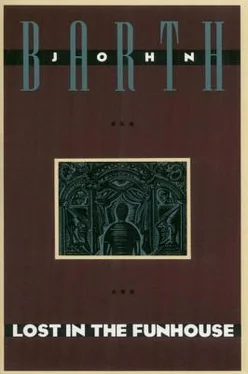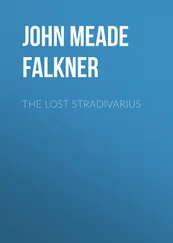John Barth - Lost in the Funhouse
Здесь есть возможность читать онлайн «John Barth - Lost in the Funhouse» весь текст электронной книги совершенно бесплатно (целиком полную версию без сокращений). В некоторых случаях можно слушать аудио, скачать через торрент в формате fb2 и присутствует краткое содержание. Год выпуска: 2014, ISBN: 2014, Издательство: Knopf Doubleday Publishing Group, Жанр: Современная проза, на английском языке. Описание произведения, (предисловие) а так же отзывы посетителей доступны на портале библиотеки ЛибКат.
- Название:Lost in the Funhouse
- Автор:
- Издательство:Knopf Doubleday Publishing Group
- Жанр:
- Год:2014
- ISBN:978-0-8041-5250-1
- Рейтинг книги:3 / 5. Голосов: 1
-
Избранное:Добавить в избранное
- Отзывы:
-
Ваша оценка:
- 60
- 1
- 2
- 3
- 4
- 5
Lost in the Funhouse: краткое содержание, описание и аннотация
Предлагаем к чтению аннотацию, описание, краткое содержание или предисловие (зависит от того, что написал сам автор книги «Lost in the Funhouse»). Если вы не нашли необходимую информацию о книге — напишите в комментариях, мы постараемся отыскать её.
Lost in the Funhouse — читать онлайн бесплатно полную книгу (весь текст) целиком
Ниже представлен текст книги, разбитый по страницам. Система сохранения места последней прочитанной страницы, позволяет с удобством читать онлайн бесплатно книгу «Lost in the Funhouse», без необходимости каждый раз заново искать на чём Вы остановились. Поставьте закладку, и сможете в любой момент перейти на страницу, на которой закончили чтение.
Интервал:
Закладка:
But though he had breathed heavily, groaned as if ecstatic, what he’d really felt throughout was an odd detachment, as though someone else were Master. Strive as he might to be transported, he heard his mind take notes upon the scene: This is what they call passion. I am experiencing it. Many of the digger machines were out of order in the penny arcades and could not be repaired or replaced for the duration. Moreover the prizes, made now in USA, were less interesting than formerly, pasteboard items for the most part, and some of the machines wouldn’t work on white pennies. The gypsy fortuneteller machine might have provided a foreshadowing of the climax of this story if Ambrose had operated it. It was even dilapidateder than most: the silver coating was worn off the brown metal handles, the glass windows around the dummy were cracked and taped, her kerchiefs and silks long-faded. If a man lived by himself, he could take a department-store mannequin with flexible joints and modify her in certain ways. However: by the time he was that old he’d have a real woman. There was a machine that stamped your name around a white-metal coin with a star in the middle: A_____. His son would be the second, and when the lad reached thirteen or so he would put a strong arm around his shoulder and tell him calmly: “It is perfectly normal. We have all been through it. It will not last forever.” Nobody knew how to be what they were right. He’d smoke a pipe, teach his son how to fish and softcrab, assure him he needn’t worry about himself. Magda would certainly give, Magda would certainly yield a great deal of milk, although guilty of occasional solecisms. It don’t taste so bad. Suppose the lights came on now!
The day wore on. You think you’re yourself, but there are other persons in you. Ambrose gets hard when Ambrose doesn’t want to, and obversely. Ambrose watches them disagree; Ambrose watches him watch. In the funhouse mirror-room you can’t see yourself go on forever, because no matter how you stand, your head gets in the way. Even if you had a glass periscope, the image of your eye would cover up the thing you really wanted to see. The police will come; there’ll be a story in the papers. That must be where it happened. Unless he can find a surprise exit, an unofficial backdoor or escape hatch opening on an alley, say, and then stroll up to the family in front of the funhouse and ask where everbody’s been; he’s been out of the place for ages. That’s just where it happened, in that last lighted room: Peter and Magda found the right exit; he found one that you weren’t supposed to find and strayed off into the works somewhere. In a perfect funhouse you’d be able to go only one way, like the divers off the high-board; getting lost would be impossible; the doors and halls would work like minnow traps or the valves in veins.
On account of German U-boats, Ocean City was “browned out”: streetlights were shaded on the seaward side; shop-windows and boardwalk amusement places were kept dim, not to silhouette tankers and Liberty-ships for torpedoing. In a short story about Ocean City, Maryland, during World War II, the author could make use of the image of sailors on leave in the penny arcades and shooting galleries, sighting through the crosshairs of toy machine guns at swastika’d subs, while out in the black Atlantic a U-boat skipper squints through his periscope at real ships outlined by the glow of penny arcades. After dinner the family strolled back to the amusement end of the boardwalk. The boys’ father had burnt red as always and was masked with Noxzema, a minstrel in reverse. The grown-ups stood at the end of the boardwalk where the Hurricane of ’33 had cut an inlet from the ocean to Assawoman Bay.
“Pronounced with a long o,” Uncle Karl reminded Magda with a wink. His shirt sleeves were rolled up; Mother punched his brown biceps with the arrowed heart on it and said his mind was naughty. Fat May’s laugh came suddenly from the funhouse, as if she’d just got the joke; the family laughed too at the coincidence. Ambrose went under the boardwalk to search for out-of-town matchbook covers with the aid of his pocket flashlight; he looked out from the edge of the North American continent and wondered how far their laughter carried over the water. Spies in rubber rafts; survivors in lifeboats. If the joke had been beyond his understanding, he could have said: “The laughter was over his head.” And let the reader see the serious wordplay on second reading.
He turned the flashlight on and then off at once even before the woman whooped. He sprang away, heart athud, dropping the light. What had the man grunted? Perspiration drenched and chilled him by the time he scrambled up to the family. “See anything?” his father asked. His voice wouldn’t come; he shrugged and violently brushed sand from his pants legs.
“Let’s ride the old flying horses!” Magda cried. I’ll never be an author. It’s been forever already, everybody’s gone home, Ocean City’s deserted, the ghost-crabs are tickling across the beach and down the littered cold streets. And the empty halls of clapboard hotels and abandoned funhouses. A tidal wave; an enemy air raid; a monster-crab swelling like an island from the sea. The inhabitants fled in terror. Magda clung to his trouser leg; he alone knew the maze’s secret. “He gave his life that we might live,” said Uncle Karl with a scowl of pain, as he. The fellow’s hands had been tattooed; the woman’s legs, the woman’s fat white legs had. An astonishing coincidence. He yearned to tell Peter. He wanted to throw up for excitement. They hadn’t even chased him. He wished he were dead.
One possible ending would be to have Ambrose come across another lost person in the dark. They’d match their wits together against the funhouse, struggle like Ulysses past obstacle after obstacle, help and encourage each other. Or a girl. By the time they found the exit they’d be closest friends, sweethearts if it were a girl; they’d know each other’s inmost souls, be bound together by the cement of shared adventure; then they’d emerge into the light and it would turn out that his friend was a Negro. A blind girl. President Roosevelt’s son. Ambrose’s former archenemy.
Shortly after the mirror room he’d groped along a musty corridor, his heart already misgiving him at the absence of phosphorescent arrows and other signs. He’d found a crack of light — not a door, it turned out, but a seam between the plyboard wall panels — and squinting up to it, espied a small old man, in appearance not unlike the photographs at home of Ambrose’s late grandfather, nodding upon a stool beneath a bare, speckled bulb. A crude panel of toggle- and knife-switches hung beside the open fuse box near his head; elsewhere in the little room were wooden levers and ropes belayed to boat cleats. At the time, Ambrose wasn’t lost enough to rap or call; later he couldn’t find that crack. Now it seemed to him that he’d possibly dozed off for a few minutes somewhere along the way; certainly he was exhausted from the afternoon’s sunshine and the evening’s problems; he couldn’t be sure he hadn’t dreamed part or all of the sight. Had an old black wall fan droned like bees and shimmied two flypaper streamers? Had the funhouse operator — gentle, somewhat sad and tired-appearing, in expression not unlike the photographs at home of Ambrose’s late Uncle Konrad — murmured in his sleep? Is there really such a person as Ambrose, or is he a figment of the author’s imagination? Was it Assawoman Bay or Sinepuxent? Are there other errors of fact in this fiction? Was there another sound besides the little slap slap of thigh on ham, like water sucking at the chine-boards of a skiff?
Читать дальшеИнтервал:
Закладка:
Похожие книги на «Lost in the Funhouse»
Представляем Вашему вниманию похожие книги на «Lost in the Funhouse» списком для выбора. Мы отобрали схожую по названию и смыслу литературу в надежде предоставить читателям больше вариантов отыскать новые, интересные, ещё непрочитанные произведения.
Обсуждение, отзывы о книге «Lost in the Funhouse» и просто собственные мнения читателей. Оставьте ваши комментарии, напишите, что Вы думаете о произведении, его смысле или главных героях. Укажите что конкретно понравилось, а что нет, и почему Вы так считаете.












